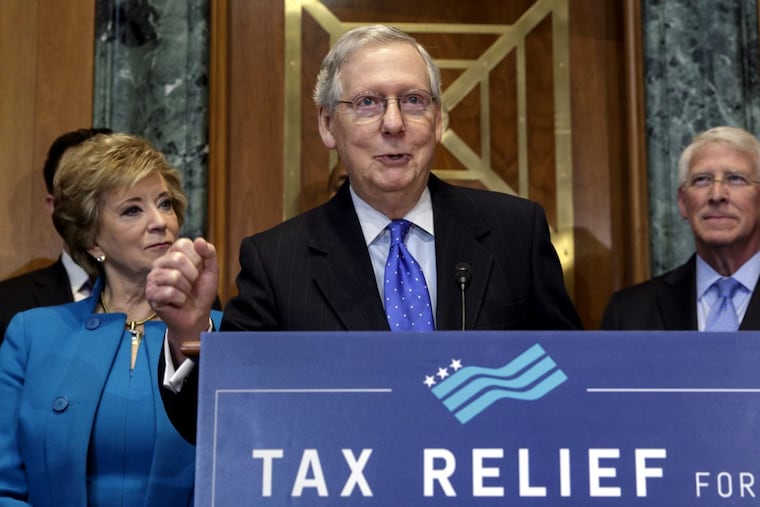Tax law creates at least 7 major loopholes that high earners can exploit
The "haphazard" nature of the cuts are "fundamentally unfair and inefficient, and invite tax planning by sophisticated taxpayers" so they can pay less, say a group of accountants and tax law professors.

The new tax bill, which the Republican Congress has passed for President Trump, will "unleash great economic growth and prosperity," but it also "falls far short of pro-growth expectations" by "artificially [and] unfairly" excluding many businesses from the bigger tax breaks that certain favored investors get, complains the Club for Growth, the pro-business lobby once run by Sen. Pat Toomey (R., Pa.).
The law as written will cost the U.S. close to $2 trillion in lost revenue over the next several years, says the Penn Wharton Budget Model. (Think that's too much? Washington spends most of our taxes on Social Security, Medicare, Medicaid, the military, and debt payback. Which should we cut, to bring what they spend closer to what we pay?)
Top tax law scholars and practitioners — led by David Kamin at NYU Law School and Rebecca Kysar at Fordham — say the law can help their clients save billions more. The "haphazard" nature of the cuts is "fundamentally unfair and inefficient, and invite tax planning by sophisticated taxpayers" so they can pay less, these analysts say. They list their findings in a 30-page paper. Highlights:
Incorporate: Since the new corporate income tax rate is only 21 percent, but individuals can still be taxed at up to 40.8 percent of their wages, high earners have a lot more incentive to convert their high-tax labor and investment income into low-tax business income.
Buy your office, and someone else's: "A significant and surprising giveaway in the conference bill" will "expand the ability of highly-paid owners in certain industries — particularly those heavy in property but with few employees, like real estate — to qualify for the pass-through deduction," which reduces the top income tax rate to a little below 30 percent.
Giving "no policy justification," the law arbitrarily gives these extra breaks to real estate investors, developers, construction engineers and architects, and other "firms that don't pay wages" but do use "depreciable tangible property," such as robotic manufacturing equipment.
While favoring real estate developers like President Trump's family, the law bars "health, law, accounting, (insurance), performing arts, consulting, athletics, financial service, and brokerage" small businesses from enjoying that same pass-through tax break. But there's a way around that, the experts say:
Be a contractor: Professionals in all fields, who are earning low-to-mid-six-figure salaries working for others, now have new incentive to "quit their job and become an independent contractor," and/or combine their practices into new partnerships in tax-protected fields, gaining access to the lower pass-through rate instead of paying the higher taxes imposed on high-wage labor.
Call your local pols: New Jersey, Philadelphia, and other places where Congress tried to cut off state and local tax breaks for high-income workers will likely "respond creatively" and try to keep that income federal-tax-free. For example, since state and local business taxes are still deductible, states could shift payroll taxes, from workers, to businesses. States could also designate public programs as charities, and fund them with tax-deductible payroll contributions.
Move jobs out of the U.S.: While President Trump says he wants to bring factories back home, the new tax law gives businesses new incentives to move operations overseas. The act lets companies collect 10 percent annual returns on foreign factories and offices, tax free. This "encourages U.S. firms to locate tangible assets and accompanying jobs overseas" and to invest abroad.
The act also sets an attractive-looking income tax rate of just over 13 percent on exports. But U.S. companies may use this to "round-trip" exports, selling U.S. goods to foreign distributors "who then resell back into the United States," thus avoiding the higher U.S. corporate income tax rate. (Sadly for exporters, the tax subsidy appears to violate World Trade Organization agreements that the U.S. has signed. European countries have already threatened to sue.)
Rent your stuff: The act sets other incentives for business "to engage in transactions that serve to basically pump money out of the Treasury and into the pockets of well-advised taxpayers." For example, equipment purchases — new or old, even sale/leasebacks of equipment currently in use — will now allow "an immediate write-off," a "generous, and unjustified, handout to existing investment."
Borrow more: The act limits business loan-interest payment deductions to 30 percent of profits. But convert that debt payment into an equity-interest partnership payment, for example through the use of pass-through entities, and you can cut your taxes again.
The act also encourages businesses to reorganize in ways that "avoid the deduction limit on executive compensation." It taxes legal settlements, including the lawyer fees that eat deeply into recoveries. It taxes some mutual fund investment losses, even if there are also gains.
Since this is all becoming law in a hurry, "we expect 2018 to be something of a 'Wild West' " for well-off taxpayers and their advisers," the analysts conclude. Given Congress' "irresponsibility" in "moving so quickly to a vote" on such a contradictory law, the tax analysts call on the IRS — depleted by years of budget cuts, and without a Trump-appointed full-time chief — to act fast to set whatever ground rules it can, before a rush of well-advised taxpayers file returns interpreting the new law in creatively liberal ways, forcing the IRS onto the defensive and the national budget deeper into deficit.